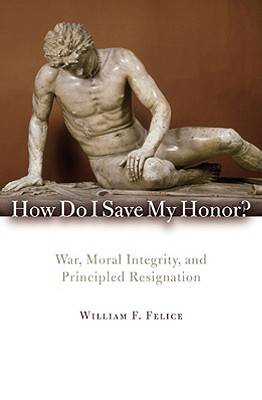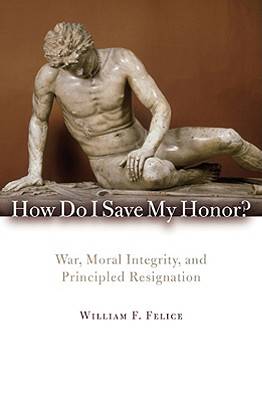
Door een staking bij bpost kan je online bestelling op dit moment iets langer onderweg zijn dan voorzien. Dringend iets nodig? Onze winkels ontvangen jou met open armen!
- Afhalen na 1 uur in een winkel met voorraad
- Gratis thuislevering in België vanaf € 30
- Ruim aanbod met 7 miljoen producten
Door een staking bij bpost kan je online bestelling op dit moment iets langer onderweg zijn dan voorzien. Dringend iets nodig? Onze winkels ontvangen jou met open armen!
- Afhalen na 1 uur in een winkel met voorraad
- Gratis thuislevering in België vanaf € 30
- Ruim aanbod met 7 miljoen producten
Zoeken
How Do I Save My Honor?
War, Moral Integrity, and Principled Resignation
William F Felice
Hardcover | Engels
€ 90,95
+ 181 punten
Uitvoering
Omschrijving
How Do I Save My Honor? is a powerful exploration of individual moral responsibility in a time of war. When people decide that the actions of their government have violated basic norms of ethics and justice, what are they to do? Are there degrees of moral responsibility that public officials, soldiers, and private citizens bear for unethical actions of their leaders and government? William F. Felice considers these central ethical questions through the compelling stories of individuals in the U.S. and British government and military who struggled to protect their moral integrity during the Iraq war and occupation. Some came to the difficult conclusion that resignation from their post was necessary to maintain their responsibility to the truth and to uphold their honor. Others decided to work from within to try to correct what they perceived as misguided policies. Examining the struggles of these contemporary men and women, as well as of historical figures facing similar dilemmas, William Felice weighs the profound difficulties of overcoming the intense pressures of misguided loyalty, patriotism, and groupthink that predominate during war.
Specificaties
Betrokkenen
- Auteur(s):
- Uitgeverij:
Inhoud
- Aantal bladzijden:
- 240
- Taal:
- Engels
Eigenschappen
- Productcode (EAN):
- 9780742566668
- Verschijningsdatum:
- 1/03/2009
- Uitvoering:
- Hardcover
- Formaat:
- Genaaid
- Afmetingen:
- 155 mm x 231 mm
- Gewicht:
- 430 g

Alleen bij Standaard Boekhandel
+ 181 punten op je klantenkaart van Standaard Boekhandel
Beoordelingen
We publiceren alleen reviews die voldoen aan de voorwaarden voor reviews. Bekijk onze voorwaarden voor reviews.











